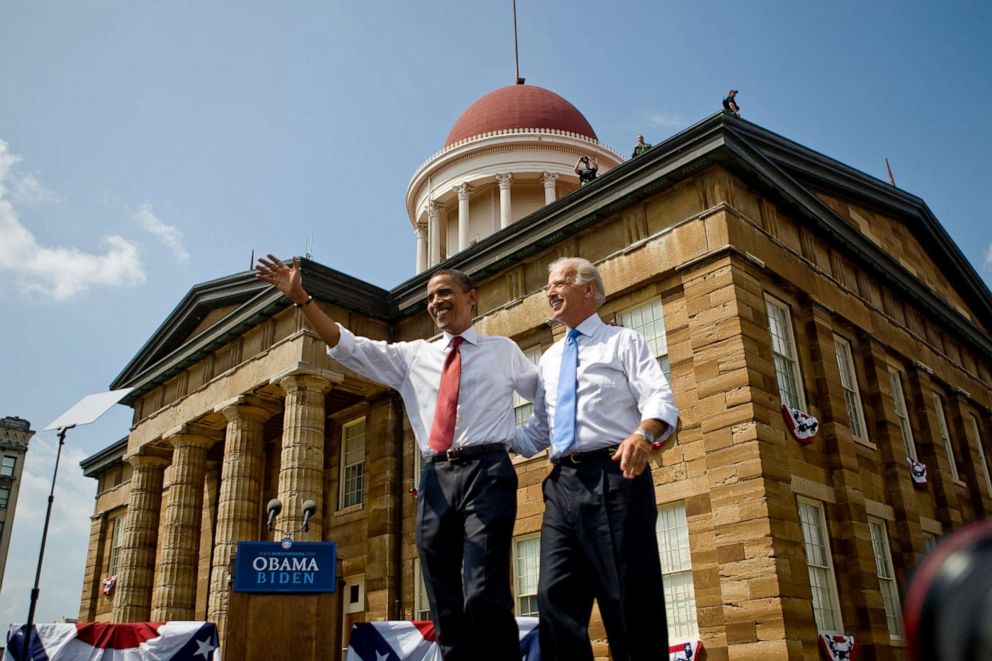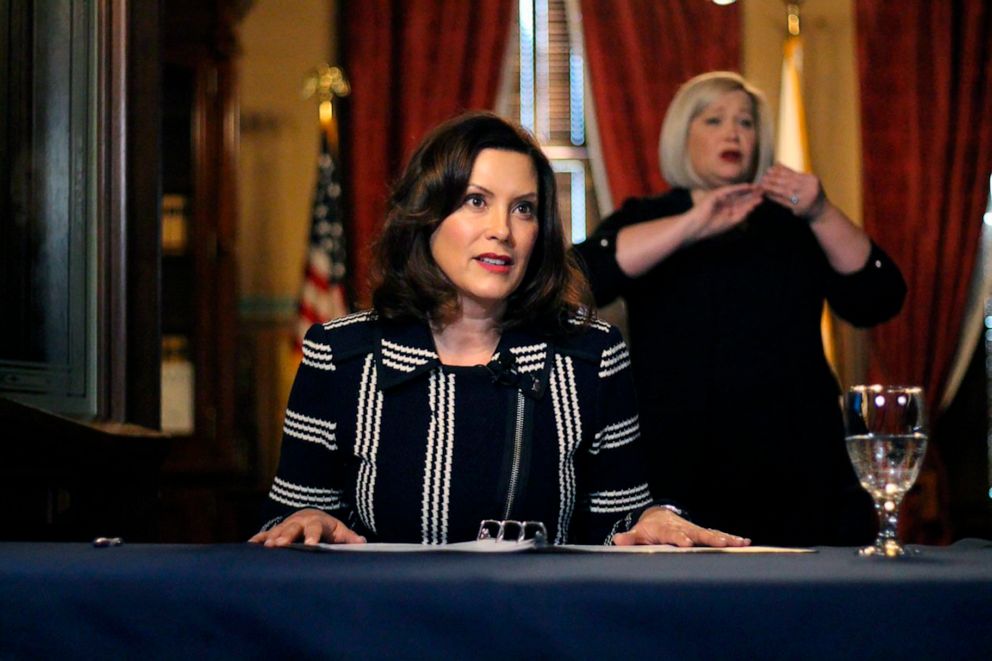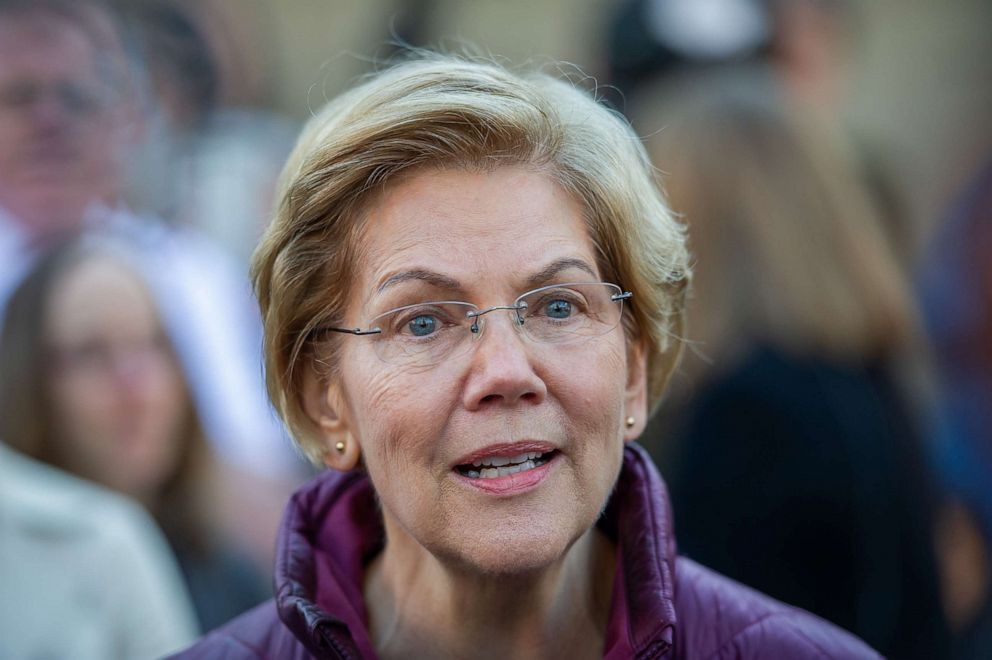Biden forges ahead with veep candidate search as coronavirus upends campaign
The candidate's team to vet picks will be in place by the end of this month.
In the week since Sen. Bernie Sanders' exit from the presidential race effectively ended the 2020 Democratic primary, former Vice President Joe Biden has begun to confront the task of both uniting a party still fractured along ideological lines, and amassing the resources to compete with the war chest of an incumbent Republican president and GOP that, as of this month, stands at roughly $240 million.
But for Biden, who at 78 would be the oldest individual ever sworn in as president if elected this November, one question looms even larger over a campaign recast and upended by a deadly global pandemic and a growing economic crisis: who will he pick as his running mate?
A senior Biden adviser said that the official vice presidential vetting process has yet to get underway, but noted it was likely to begin soon with the primary wrapped up.
Sources familiar with the campaign’s thinking say it’s likely the team Biden assembles to vet potential running mates will include a mix of longtime allies and top lawyers. National campaign Co-Chairman and Louisiana Rep. Cedric Richmond, as well as former Biden Chief of Staff Ron Klain are likely to be part of the group tasked with the running mate selection process.

Prominent backers of the former vice president are already lobbying for their preferred picks, which range from some of the party's most high-profile female African-American lawmakers, governors guiding their states through the ongoing crisis, and leading progressive voices that could help mend ideological fences and boost enthusiasm to compete with Trump.
One advantage Biden will soon have as he pivots to the general election is the ability to fundraise jointly with the Democratic National Committee, which last week announced its suite of programs it is rolling out to back his campaign, many of which target states the candidate will need to defeat Trump in November.
The challenge for Biden, aware of his age and the concerns it brings, in choosing his running mate mirrors the broader questions he is confronting now that he is all but assured the nomination.
Does he attempt to bridge the ideological and generational divides within the party with a pick that excites its liberal base and motivates younger and progressive voters to the polls?
Does he choose an African-American woman as a nod to the base of support that propelled him to the nomination?
Or does he double-down on the pragmatic approach he adopted in the primary and choose a running mate that could help him consolidate support among white, working class voters that migrated to Trump in 2016?
As the race stands now, the coronavirus may have re-scrambled those calculations already perhaps placing a higher urgency on finding a running mate with proven executive experience and the ability to convince a nervous country they could handle the pressures of the Oval Office themselves in the midst of a crisis.
“The crisis has redefined the campaign, not only in how the campaign will be conducted, in what it's about. It will be about public health, it will be about...scientific expertise, it will be about health care insurance,” said Julian Zelizer, a professor of history and public affairs at Princeton University. “I think there was a path for him to win as a non-Trump candidate, but I think now people want more. I think as he's thinking of the pick...you can't ignore this is happening.”
Biden is no stranger to the vice presidential vetting process, having gone through it 12 years ago. The former vice president has not been shy about talking about picking a presidential running mate--a question that came up often while out on the campaign trail, long before he was the last man standing in the Democratic Primary.
“For me it has to be demonstrated that whomever I pick, is two things. One, is capable of needing to be the President. Because I’m an old guy. Okay? No but I’m serious,” Biden when asked about who he might consider for the position during an event in Clinton, Iowa in January.
“People are going to look and say: ‘Is the person that Biden picks capable, if God forbid something happened to Biden, that they would be able to take over immediately.’ And so, that is the first criteria,” he continued.
The list of possible candidates narrowed in March, when Biden committed to choosing a female running mate during the final Democratic debate of the 2020 cycle, after deciding he wanted to make a “big commitment on a big stage,” according to Biden campaign senior advisor Symone Sanders.
On ABC's “The View” last month, Biden said he had hoped to narrow the list down to roughly 11 possible candidates, and now the presumptive nominee is getting the vetting process underway, looking to assemble a team to find the person best suited to join him at the top of the ticket.
“In the coming weeks we're going to put together, before the end of the month, start looking at candidates. And I'm looking for someone who will be a partner in this progress. Someone who is simpatico, and someone who's ready to be president on a moment's notice,” Biden said last week at a virtual fundraiser just hours after Sanders, his lone rival for the nomination, dropped out of the race.
Looking to Obama
As Biden’s focus now turns to the general election, he has turned to his former boss, President Barack Obama, who made Biden his running mate in 2008 in large part to compensate for his lack of Washington experience, for advice. That calculus is now flipped, as the elder statesman looks for a running mate that brings balance to his long history in the nation’s capital.
“Biden himself was an effort to balance many of the questions about Obama, that's exactly how he was picked. He was older with more experience, Obama was younger, less experienced...He was literally the antidote to some of the things that [Obama] lacked. And I think that's the kind of thinking that Biden is going to go through,” said Zelizer.
The former vice president said he was told by Obama, who formally endorsed Biden on Tuesday, to seek that same balance that allowed their own relationship to flourish.
“So I'm going to need a woman vice president who has the capacity, has strengths where I have weaknesses,” Biden said last week.
Obama himself has spoken with several former 2020 candidates, including Sanders, in recent weeks about how to best position the Democratic Party to win in November, according to a source familiar with the conversations, and stressed that defeating Trump is “paramount.”
The delicate balance between the political, professional and the personal aspects that Obama weighed in 2008 now find themselves at the core of Biden’s search.
Ohio Congressman and former presidential candidate Tim Ryan, who endorsed Biden in November of last year, said the running mate search is a “constant conversation” within the campaign that has taken on new urgency following Sanders’ exit from the race and with the stark backdrop of a global pandemic.
“It's the two main essential aspects: can they help him win, and can they step in and be a leader and lead the country...help govern the country,” Ryan told ABC News.
“Nobody is ready to be president. That's the dirty little secret...if there's anybody close, it's Joe Biden,” Ryan added. “But there's no preparation really for the job when you're talking about, okay I’ve got to find somebody who is prepared to be president. It’s this: do you have the requisite temperament, do you have the requisite mind and intellect and emotional strength, to be able to do the job...Do you have the nerve?”
A list takes shape amid a crisis
The list that has taken shape thus far, molded by Biden's public hints and comments from his allies, includes a familiar host of names. From former 2020 presidential candidates, to prominent governors who have newfound visibility as they lead their states through the COVID-19 crisis, the names reflect the uncertainty about what kind of balance Biden is seeking to bring to the ticket with his pick.
“She made the list in my mind two months ago,” Biden said in an interview with MSNBC last month of Michigan’s Gretchen Whitmer, the battleground state governor who has clashed publicly with Trump amid the COVID-19 crisis and appeared on an episode of the former vice president’s newly-debuted podcast, “Here’s the Deal.”
Whitmer has shrugged off the talk, telling ABC News’ Amy Robach last week that it’s “truly an honor,” to be considered for the VP slot, but adding that her focus right now is solely on getting her state through the ongoing public health crisis.

“I'm so lucky to have you as part of this, this partnership going forward,” Biden said to California Senator Kamala Harris last Wednesday as she co-hosted a fundraiser for the candidate. “Because I think...we can make a great deal of difference, and the biggest thing we can do is make Donald Trump a one-term president. So I'm coming for you, kid.”
“I know that conversation is taking place in the press and among pundits and I'm honored to even be considered,” Harris said recently on ABC’s “The View” when asked about the speculation.
Among the other names Biden himself has mentioned or have been floated as potential picks are Minnesota Sen. Amy Klobuchar, Nevada Sen. Catherine Cortez Masto, Illinois Sen. Tammy Duckworth, Florida Congresswoman Val Demings, former Georgia Gubernatorial candidate Stacey Abrams and New Mexico Governor Michelle Lujan Grisham.
“I would be honored to be on the campaign trail as a running mate. But that is a process that you can’t campaign for, and I’m not campaigning for it – just being straightforward,” Abrams said on an episode of Pod Save America last week.
Two of Biden’s most prominent African-American supporters, House Majority Whip Jim Clyburn, who many credit with reviving the candidate’s lagging campaign with his endorsement in the final days leading up to February’s South Carolina primary, and civil rights icon John Lewis, have both expressed their desire to see the former vice president select a woman of color as his running mate.
“It would be good to have a woman of color. It would be good to have a woman. It would be good to have a woman look like the rest of America -- smart, gifted, a fighter, a warrior," Lewis, who recently endorsed Biden, said on a call with reporters earlier this month.
“My preference would be a black woman,” Clyburn told the New York Times earlier this month.
While those conversations continue, and Biden assembles the team that will carry out the complicated vetting process, another one of the party’s most strident liberal voices remains a wild card: Senator Elizabeth Warren.
Courting the left
Perhaps the biggest challenge facing Biden in the 2020 race is earning the support of the progressive wing of the party following the departure of Sanders, who has subsequently endorsed him, from the race-- a challenge the former vice president is taking seriously, as residual resentment from progressive Democrats still lingers from the 2016 election.
"The more progressive the vice presidential candidate that he nominated, the better it would be in terms of the kind of response that our supporters would provide him,” Sanders, whose surprised endorsement of Biden marked a major show of party unity, said in an interview on PBS NewsHour last Friday of the former vice president’s potential running mate.
During his first day as the presumptive nominee, Biden adopted two left leaning policy positions, forgiving student debt for middle class and low-income families, and lowering the eligibility age for Medicare to 60, including a direct overture to Sanders supporters in the policy release.
“Senator Sanders and his supporters can take pride in their work in laying the groundwork for these ideas, and I’m proud to adopt them as part of my campaign at this critical moment in responding to the coronavirus crisis,” Biden wrote in a Medium post announcing the shift.
The focused effort to appease the left wing of the party could creep into Biden’s vice presidential pick, and one woman who could fit the bill is Warren, who on Wednesday became the third leading Democrat in as many days to endorse the former vice president's campaign.

“I’m a progressive woman. I'd like to see a progressive woman. I'd like to see, if possible, a woman of color,” New Mexico Congresswoman Deb Haaland, who served as a national co-chair of Warren’s campaign, told ABC News.
While Haaland added that Biden should “absolutely” consider Warren as his running mate, she conceded that no-matter the ideological leanings of the woman he chooses, the ultimate goal remains the same: defeating Donald Trump.
“I'll be honest with you...of course I would love to see a progressive vice president. However, I want to make sure that Trump is gone regardless,” Haaland, one of the first Native American women elected to the U.S. Congress, said. “Whatever decision the nominee makes...I'm in 100%. I will help Joe Biden to win this election. No matter how hard I have to work.”
“Jobs [are] gonna be such a big issue and no one speaks about that as much as Elizabeth Warren, the insecurity of middle class life...She's older but...she was pretty good working the modern media," Zelizer said. "She brings a lot to the table. And so I think it's probably more possible now than it was before [the coronavirus pandemic] defined the campaign,” Zeltzer said.
While Warren has continually insisted that her focus is dealing with the coronavirus pandemic when asked about vice presidential whispers, she’s had kind words for the former vice president recently.
“Every time he has a chance to talk I'm reminded though, he is a good and decent man. And as a leader, he would not be putting himself first, he would be putting first, the interests of the American people,” Warren said during a recent interview on Sirius XM radio.
“He would understand at a human level what's like this pandemic means to Americans. And I would have no doubt that he would both be doing everything he could to have a strong response, and that he would run a competent government with smart people to help get that done,” Warren continued.
Biden, too, has inched towards Warren on policy--adopting her bankruptcy proposal, and joining her calls for $10,000 in student debt to be included in future stimulus plans to deal with the economic impact of COVID-19. Biden and Warren’s campaigns were in touch prior to his adoption of her bankruptcy plan.
Biden is not alone in endorsing Warren’s plans--former President Obama has also signaled his support for Warren’s proposals in a recent tweet.
“As she often does, [Senator Warren] provides a cogent summary of how federal policymakers should be thinking about the pandemic in the coming months,” Obama tweeted early last week.
But Warren’s progressive outlook could serve as a double edged sword, both making her an appealing bridge to that wing of the party, but raise questions about if the Massachusetts Senator is “simpatico” with Biden on policy and political outlook -- a term he often uses to describe why he and President Obama were an effective executive team.
"I have a lot of shortcomings. And every president has shortcomings. I would try to find somebody who, number 1, agreed with me in principle and philosophically where I am but also someone who in fact could make up for some of my weaknesses and someone who can just simply trust, trust," Biden said in an interview in November.
Get 'personal'
Biden and his campaign are still in the midst of the first step in the vetting process: assembling the team tasked with investigating the candidates on the former vice president's list. Ideology, favorability, geography, and more will be on the table, but there is one critical factor that Biden himself will have to take into account.
“Make sure you have a personal relationship,” Rahm Emanuel, a former chief of staff to President Obama and Clinton campaign aide, told ABC News.
“You can figure out all the other things that you need to figure out about what you may need for this election and so on and so forth—but first and foremost, do you trust them, and do have a personal chemistry with them? Because that's going to be essential for everything you're going to do both through the election and afterwards.”
Emanuel was part of the team who helped with former President Bill Clinton’s vice presidential search, and recalled it was an off-handed comment from the former president at the end of their first meeting to discuss the vice presidential pick that revealed his personal admiration for the man who would go on to become his second-in-command.
“As we stood up, he said, ‘You know, Senator Gore wrote a really interesting thoughtful book. It was--a lot of deep thinking gone into it.’ And that struck me when it came to the conclusion that he picked him, that there was something that, you know, attracted him to Al Gore,” Emanuel, an ABC News contributor and former Chicago mayor, said.
Ultimately, Emanuel said, that personal connection is something only Biden can determine--a concept the former vice president likely has a keen understanding of after serving eight years along a man whom he called “a brother and a best friend forever.”
“You'll do the research. You'll do all the background. You'll check do they help me with this constituency, or do they help me with that state? You'll do all that calculations, and that's almost on the top. But the one thing that nobody else can tell you is that level of trust with that level of that chemistry that you need,” Emanuel said.




